Peter MALONE
Red Shoes and the Seven Dwarfs
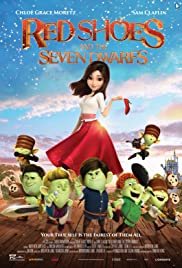
RED SHOES AND THE SEVEN DWARFS
Korea, 2019, 93 minutes, Colour.
Voices of: Chloe Grace Moretz, Sam Claflin, Gina Gershon, Patrick Warburton, Jim Rash.
Directed by Sung-ho Hong.
This is a Korean animated film, computer-generated. It is quite lavish in its style, its landscapes, depiction of characters, situations. It has an American and British voice cast.
As from the title, there are indications of Hans Christian Andersen’s story of the red shoes, the fatal shoes and the dancing heroine. There are also echoes, of course, from the Brothers Grimm’s story of Snow White and the Seven Dwarfs. And this story has elements of Cinderella (from Charles Perreault).
However, there are some 21st-century sensibilities in style, comic adventures, explosions and conflict…
However, the film is significant in its message of role reversals.
The film has seven princes who defend a Princess from a Dragon but then are cursed by the Queen and become green dwarfs. They can be healed only when there is a kiss from the most beautiful woman in the world. They go on their adventures, camaraderie, led by Merlin (voiced by Sam Claflin) who can sometimes appear as a dashing Prince but then reverts.
The wicked queen, Regina, (voiced by Gina Gershon) takes over the kingdom, turning the king and the little children into wooden dolls. However, his daughter, escapes. She has a pair of red shoes which grow on an Apple tree – and Regina is envious, starts jealous pursuit. She engages the help of the local Prince, Prince Average. He is quite ineffectual in his confrontations, especially with Merlin and the dwarfs.
The main difference is that Snow is a rather pudgy girl. When pursued and wearing the red shoes, she can turn into a beautiful princess. And there are some interactions between herself and Merlin and the various changes.
However, ultimately, with the defeat of Regina, with the king and the little children turning back into their selves, with Merlin appearing as a Prince, Snow retains her real former presence as the overweight girl. She too can be the heroine of a fairytale.
Monster/ US
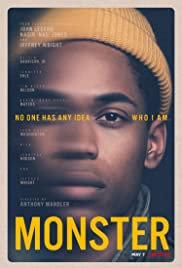
MONSTER
US, 2018, 98 minutes, Colour.
Kelvin Harrison Jr, Jennifer Ehle, Jeffrey Wright, Jennifer Hudson, John David Washington, Paul Ben- Victor, Tim Blake Nelson.
Directed by Anthony Mandler.
Netflix has record resurrected this attention-grabbing drama. Filmed in 2017, briefly released in 2018, it disappeared until streamlined in 2021.
While it was relevant at its time, racist typing of young black men by police and the law, it is more relevant in its later release, especially in the context of the police killing of George Floyd in Minneapolis in 2020 and the consequent Black Lives Matter rallies, not only in the United States, but all around the world.
This is the story of a young man, Steve Harmon, 17, peaceable, living with his sympathetic parents (played by Jeffrey Wright and Jennifer Hudson), a photographer, interested in filmmaking, attending courses at a New York college, encouraged by his lecturer (Tim Blake Nelson).
There is an attempted robbery in a Korean bodega in the city, some suspects arrested, surveillance footage suggesting that Steve was part of the robbery which led to a murder. Without notice, he is dragged by the police from his home and sent to jail. He is both bewildered and embittered.
His play by Kelvin Harrison Jr who was emerging at this time as a substantial actor and who went on to greater success in films like Luce and Waves.
The film shows the legal aspects of the case against him, spending some time with his initial reluctance to talk to the legal counsel appointed to his case, played with a blend of businesslike efficiency and compassion by Jennifer Ehle. There are the sequences in court, the severe and aggressive cross-examination by the prosecutor, Paul Ben-Victor. And there is the anguish of his bewildered parents watching the proceedings, his girlfriend also present, supporting him as she did by collaborating with him in his photography and film studies.
This idea of making a film is to the fore in the early sequences, some verbal descriptions of how the film’s screenplay might appear on the page.
The court case is complicated by witnesses, surveillance footage, Steve and his passing acquaintance with the other two accused of the crime (including one giving witness against his companion, who is played by John David Washington).
The film develops with the experience of Steve in prison, some fellow prisoners encouraging him, his discussions with his attorney, the plea that he will make, just telling the truth.
This would be a harrowing case no matter what the ethnic background of the central character accused. But, in the American context and Black Lives Matter, it is more significant.
A drama that is worth giving attention to.
- The distribution history of the film? 2018, 2019 – and held over till 2021?
- The title, the accusation in the court room, the young men of the murder, labelled as monsters? The unjust labelling of Steve Harmon?
- The New York setting, homes, college, classrooms? The streets, the shops? Prison, cells, yards? The courtrooms? The musical score?
- The complexity of the scenario? The crime? The video of the crime? Of Steve exiting the store? The arrest at home, charged, the prison sequences? The flashbacks to the film classes? The discussions with Maureen O’ Brien? The courtroom scenes? Presented in jigsaw fashion for the audience to determine what happened, Steve’s presence and motivations, the criminals, the using him, his willingness and compliance? Guilt? And his parents?
- The portrait of Steve Harmon, a good young man, 17, at home and the strength of his parents, his girlfriend and his photographing her, his film work, the teacher at the film school and his enthusiasm? The appeal by the lawyers, that he could not have committed the crime?
- Steve and his film talent, his work, photographs, videos? In class discussions?
- The device of suggesting that the court case could be designed as a film, setting, framework, close-ups…?
- The arrest, at home, the police and their treatment, the comment about the treatment of black suspects? His parents’ response? The interrogations, entry into jail, searches, the clothes, the cell and sharing, the effect on him, his comments about the other prisoners, the shouts and cries in the night? Other prisoners – and, especially the prisoner at the end who encouraged him before the trial? The impact of prison on him at this age?
- The meetings with Maureen O’ Brien, his wariness, responses, gradually trusting her? Her job, not judging him guilty or not, but her change and belief in his innocence, his overhearing her talking outside the room? The planning forl for the defence, questions, strategies, tactics? Maureen and her behaviour in the court, the cross examinations, her interventions, her please?
- Petrocelli, the prosecutor, his attitude, the severity of his questions, the implications, having to withdraw some, the attitude of the judge?
- The leader of the gang, in court, his defence, his angry outbursts and apologies, Bobo and his coming from prison, to give testimony, the leader eying him in the court? The flashbacks to the situation, Steve and his encounters, in passing, acquaintances, the final revelation that they had asked him to give the signal?
- Bobo, prison, an acquaintance for Steve, his not knowing him well? His testimony in the court? The intimidation?
- The final preparation, Steve dressing up, his mother’s visit to the prison, his father? His mother’s religious beliefs, trying to give him the Bible, getting him to repeat the Psalm? His dressing well, relying on his integrity to make an impression?
- The scenes of the jury, the different members, listening, passive and impassive?
- Steve going on the stand, his entering the questions?
- The leader of the gang being found guilty? Steve, standing, waiting the verdict, tears, not guilty? His parents welcoming him?
- The comment about police, suspicions of black young men? At the time the film was made? And its release in 2021 and the aftermath of the 2020 rights and Black Lives Matter?
Sicilian Ghost Story
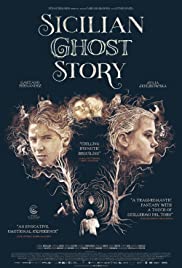
SICILIAN GHOST STORY
Italy, 2017, 122 minutes, Colour.
Julia Jedlikowska, Gaetano Fernandez, Vincenzo Amato, Sabine Timoteo.
Directed by Fabio Grassadonnia,Antonio Piazza.
This film is based on actual events, the abduction of a young boy in Sicily by the Mafia, their holding him for two years, and his being strangled and his body dissolved in acid. While these aspects are treated in this narrative, the treatment is far different and stylised, witnessed by the title and the emphasis on a ghost story.
Audiences bring to this film their knowledge of the Mafia and its violent dealings, its hold over its citizens, the threats to those who speak to the police, ultimate ruthlessness.
However, the focus is on the young boy, Giuseppe, a likeable boy, active in sports, good at school, with friends. The focus is also on a young girl in the class, Luna, who initially keeps her distance from Giuseppe but is charmed by him and the friendship grows. Then he disappears. She is concerned, preoccupied, obsessed. There are scenes with her rather haughty mother and her diabetic and more passive father. There are discussions with her girlfriend from school and a range of other friends. So, on the one hand, there is something of a realistic background for Luna’s, experience, the film becomes more surreal, a mysterious lake, Luna entering into Giuseppe’s world, a communication with him. He, on the other hand, has to cope with the behaviour of his jailers, confined quarters, harsh treatment, but often consoled by re-reading the final letter to him from Luna.
For audiences used to Italian real -like dramas about the Mafia, this will be something of a difficult film. For audiences who enjoy the atmosphere of the surreal, atmosphere and suggestions, situation and character, mysterious behaviour, this film will be appreciated.
Second Time Around, The/ Morse
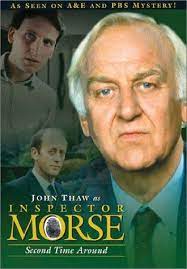
THE SECOND TIME AROUND (MORSE)
UK, 1991, 104 minutes, Colour.
John Thaw, Kevin Whately, Kenneth Colley, James Grout, Pat Heywood, Ann Bell, Oliver Ford Davies, Christopher Eccleston.
Directed by Adrian Shergold.
All the episodes of the television series, Inspector Morse, are enjoyable. Interestingly, comment on this one indicates fans think it is one of the best. John Thaw is the perfect Morse, Kevin Whately as Lewis.
There are all the familiar ingredients. We enjoy the Oxford settings and the glimpses of familiar buildings of this city. And there are the scenes in the surrounding countryside, country mansion is.
There is an introduction to the police force, some old colleagues who worked with Morse, especially chief Dawson (Kenneth Colley) and the celebration for a retiring officer-Detective. Who is found dead the next morning. An intruder glimpsed.
Morse and Lewis had been at the celebration, Morse having worked with both offices initially. When the developments indicate a previous case where Morse had found the body of a dead girl, it is the second time around. She strange (James Grout) is still in charge, ever-exasperated by Morse.
In fact, Moore seems grumpier than ever in this episode, being dogmatic, even sneering. And, as usual, he seems to take it out on Lewis. Lewis is his genial self, patient in putting up with Morse, even developing a theory which Morse dismisses.
With the introduction of one of the neighbours, a dyslexic young man who is talented in drawing birds (Christopher Eccleston), the antenna a of suspicion go up. And, when all is revealed, most audiences will be satisfied but definitely not surprised.
- The popularity of the Inspector Morse series, from the 1980s into the 1990s, and for decades long after? This film coming in the middle of the series?
- The popularity of the Oxford settings, the city, streets, homes, police precincts, the colleges, the surrounding countryside, mansions? The musical score? Morse’s love of classical music?
- The establishing of Morse’s character, age, his past as policeman, his workers detective, over the decades? Described here as bad policeman, good detective? His interactions with Chief Strange? With other officers? Other experts, autopsies, photographic developments…?
- Lewis and his character, ordinary, the contrast with Morse, the glimpse of his home life and family, his work as a detective, at Morse’s beck and call, defying him here, Morse angry with him, apologies?
- Morse, angry, grumpy, assertive, arrogant, unapologetic?
- The development of the murder mystery? The experienced detective, the celebration of his career, drinking, taken home by Dawson, the intruder, the struggle, hitting his head, his death? The intruder taking files?
- Dawson, his career, personality, collaboration with the dead man, concern about the investigation? The past clashes with Morse? Morse and Lewis at the celebration? Morse and the steps for solving the case, the footprint outside the window, questions for the housekeeper, for Dawson, for Mrs Dawson (and Morse’s having the dinner with her at the restaurant)?
- Morse and his tracking down the writer, his eccentric behaviour, mannerisms, the plan to write the book, the information about the missing chapter, the particular case?
- Morse and his involvement in the past case, finding the body, detective work, Briers is the main suspect, his alibi with his sick daughter, briars changing his name to Redpath, his being present at the dead policeman’s house, the revelation of his motivation to keep his name clear, his arrest, interrogation, refusing to answer, Dawson interviewing him and declaring his innocence, his daughter and her outburst? His depression, attempting to kill himself? In hospital?
- The issue of the diary, three different typewriters, confession? In the initial investigation? Strange urging further investigation? Morse unwilling, Lewis interested, Lewis developing a theory?
- The background of the murder of the little girl, her mother and her illness and death, the mystery of the girl’s father? The issue of Briars’ knife and loss? Morse and his interview with the grandmother, the photo, the delegate’s badge, the enlargement of the photo? Providing the clue?
- The Mitchells, neighbours, the grandmother and her friendship with Mrs Mitchell, the story of Mitchell, his work, bullying his son, disappearing? Disappearing at the time of the emergence of the diary? Terry Mitchell, art and sketches, dyslexic? He and his mother and their secret? His mother visiting the grandmother?
- Morse investigating John Mitchell, the factory, his disappearance? The revelation of the truth, Mitchell protecting his son? And his death and disappearance?
- The solution of the case, the confrontation between Dawson and Morse, in the presence of Dawson’s wife, the truth about his affair, fathering the girl, the annual meetings with her mother, the delegates badge? Dawson killing Mitchell in revenge?
- Case solved, police methods, and further insights into Morse and Lewis?
Spontaneous
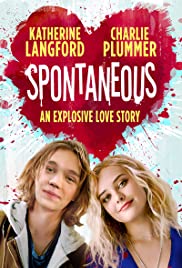
SPONTANEOUS
US, 2020, 101 minutes, Colour.
Katherine Langford, Charlie Plummer, Hayley Law, Yvonne Orji, Piper Perabo, Rob Huebel.
Directed by Brian Duffield.
If ever there was a film directed towards an older teen audience, Spontaneous is it. It also has a classification that marks it is not suitable for those under 15. There is a lot of crass language throughout the film, taken for granted. There is also the issue of popular drug use amongst high school students – and some parents. And there are sexual issues.
Audiences, possibly 30 and over, might find this immersion into the teenage world more than trying. Audiences 40 and over, will definitely find the experience more than trying.
Those who support the film are very strong in reminding commentators that the whole thing is a metaphor, linking it to the random shootings in American schools, from Columbine on, a series of violent attacks on the young. These attacks and killings make life as a teenager at home and at school somewhat precarious, wondering what the next attack will bring and when it will happen that life is more transient than they thought.
So, the metaphor is about spontaneous combustion amongst the students, suddenly in the classroom, in a school corridor, at an outing… And, over a period of months, the number increases so that the class where the explosions occur become more carefully supervised, on medication, in special class situations with special agents and teachers, moving the students towards graduation.
The central character, Mara, is played by Katherine Langford (originally from Perth). She gives the impression of being completely self-confident, with posturing, language, assertion to match. She has a good friend from infant school days who tries to keep an eye on her and control her, offering some critique. The friend also wants to graduate. Mara also has a secret admirer who is revealed as a fellow student who has newly come to the school, Dylan (Charlie Plummer, Words on Bathroom Walls, All the Money in the World, Lean on Pete). He is rather shy, somewhat awkward, more than a touch romantic, becoming more involved with Mara, ultimately sexually.
Mara is supported by her parents who try to make her at ease, smoking the drugs with her. Mara drinks a lot, often drunk, confronting teachers and agents, especially in her graduation speech.
When Dylan explodes, Mara feels bereft – and, in discussions at the end of the film, she admits her diffidence, her low self-image. However, with the explosion metaphor, and her discussions with Dylan’s mother, the verdict is that “life sucks”. But, there is a somewhat hopeful conclusion that while life might be short, uncertain, we still have life until it is taken away and therefore the most to be made of it. There is a tongue in cheek ending when Mara tells us that she could be President of the United States and there is a glimpse of her taking the oath of office!
Drole du Pere/ Elephant and the Butterfly
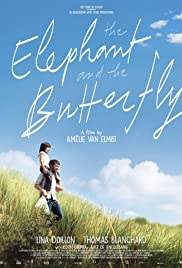
DROLE DE PERE/THE ELEPHANT AND THE BUTTERFLY
Belgium, 2017, 86 minutes, Colour.
Thomas Blanchard, Lina Doillon, Judith Chamla, all Xavier Seron.
Directed by Amerlie van Elmbt.
The French language title indicates the role of the father but with something funny, different… The English title, however, refers to a bedtime story that the little girl asks her father to read, something of a metaphor.
There is a genial atmosphere about this story, about an absent father who has not married the mother, returning and seeing his daughter for the first time, the mother rejecting him but then needing him to babysit their daughter.
Part of the delight of the film is seeing the effect of the little girl on her father, his paternal feelings, sharing the day with her in all kinds of child activities, painting, cooking, outings to the beach, to the fair, having to take her to his home when he loses the keys of the apartment, his needing to go to an interview about his work as a chef, getting his genial brother to look after the little girl. And, ultimately, taking her to his mother’s home and a birthday celebration.
The focus is very much on the little girl, played by Lina Doillon, very effective, appealing to the audience. Thomas Blanchard is able to communicate his bewilderment at encountering his daughter, then his joy in sharing her life.
- The title? Something funny? Something unusual, the touch of the strange? With the father?
- A Belgian film, the city settings, homes, streets, parks, country homes? The musical score?
- The English title, the bedtime story, Elsa and her liking the story, Antoine reading it? The telling during the film, the long interruption, the conclusion? As an image of Elsa and Antoine?
- Camille, busy, ambitions for an office, her partner, the hurry, the babysitter not answering? Antoine visiting, Camille rejecting him? Becoming desperate, chasing him, urging him to stay with Elsa till the babysitter arrived?
- Audience picking up the background, Antoine as Elsa’s father, his absence, return, Camille’s attitude? His seeing his daughter, the opportunity to be with her?
- Antoine and his day with Elsa, at home, getting to know her, her age, toys, drawings, their activities in the house, cooking, painting? Going out? At the fair? At the beach? Audiences enjoying this bonding between father and daughter?
- Antoine and his own life, the issue of being chef, the ownership of the restaurant, the conditions, his meetings? Going to the institution and settling the woman in? The irony of his losing the keys, going to his home, getting his brother to look after Elsa? Xavier and his being very genial playing with Elsa, minding her?
- Camille, the phone calls, her concern?
- Antoine taking Elsa to meet his mother, the rest of the family, his mother’s birthday, the cake, blowing out the candles?
- Camille, her return, going to the family, showing the birthday, her tensions, talking with Antoine?
- The experience for Antoine, for Elsa? Future possibilities?
Breaking Bread
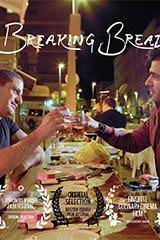
BREAKING BREAD
Israel, 2020, 85 minutes, Colour.
Dr Nof Atamna- Ismaeel.
Directed by Beth and Elise Hawk.
Actually, there is very little bread to be seen in this quite spectacular chefs’ story. The focus is on a vast array of dishes manifesting the creativity of that area of the Middle East referred to as the Levant, ranging from Syria through Lebanon on to Israel and Jordan to the Gaza Strip. And for audiences outside the area, these dishes have star quality! As the camera frequently moves to extreme close-ups, it is almost as if these dishes were echoing Gloria Swanson’s demand in Sunset Boulevard, “I’m ready for my close-up….”.
Given the enormous popularity of television programs like Master Chef, there is a vast audience and they are ready, even eager, for this kind of documentary and one hopes they hear about it and go to enjoy seeing it.
Speaking of Master Chef, the host for this documentary and for the Festival is Dr Nof Atamna Ismaeel, Israeli- Arab background who some years ago excitedly won Israel’s Master Chef competition. Already, in herself and in her talent, she is a sign for peace in the region. She is a very genial host, offerings all kinds of information, a good tour guide for all the dishes which will feature.
The audience is invited to the Israeli coastal city of Haifa. There is to be a special three-day food festival, especially of Arabic cuisine, presented in the context of Israeli cuisine, a festival of collaboration. In fact, the film opens with a quotation indicating that while food will not be the solution for world peace, it is a good start. And here we see it in action.
In fact, the participants often point out that they are citizens of Haifa, Jewish, Muslim, Christian, are able to live in harmony, critical of the small percentage of extremists in the city. They do not shirk the difficulties and tensions in Israel and the Gaza Strip, but emphasise that common humanity is the key to living together.
And this is nicely exemplified by three pairs of chefs who work on the specialist dishes. There are pairings of Jewish whose ancestors migrated from Europe and an Arab Israeli living in a town bordering on Lebanon which then was cut in half, one part in Lebanon, the other in Israel. There is also a chef with French Catholic and Jewish parentage, another whose ancestors came from Morocco. And there is a genial middle-aged couple who for decades have shown harmony in their marriage, she Jewish, he Arab, but both considering themselves Israelis.
So, the political situation is not ignored.
But, the focus is definitely on the food, visits to markets, selection of fish, meats, vegetables, explanations of specialties of the region, the detailed preparation of the ingredients, techniques of preparation, cutting and chopping, plate arrangements, sources and oils, salads, fish and lamb, cooking and timing… And, of course, the finished products in those spectacular close-ups.
The main participants (interestingly the featured chefs are men) own restaurants and tell the stories of their families, the origins of the restaurants, customers. On the other hand, talking head interviews of Festival judges indicate that many of them are women.
So, Breaking Bread might be called a specialist film – but, amongst the audiences who will enjoy it, there are many cooks who would love to be specialists!
Finding You
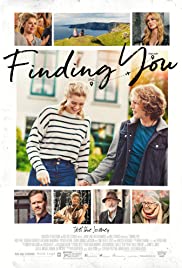
FINDING YOU
US, 2021, 118 minutes, Colour.
Rose Reid, Jedediah Goodacre, Katherine McNamara, Vanessa Redgrave, Tom Everett Scott, Judith Hoag, Saoirse- Monica Jackson, Patrick Bergin, Fiona Bell
Directed by Brian Baugh.
Finding You is a pleasant way of indicating that this is a story of finding oneself (nicely finding good selves in others). This is a pleasingly entertaining story with quite a number of strands, subplots, plenty for the young adult audience, enjoyment for the middle-aged, and some good drama for older audiences – and some visual echoes of Game of Thrones for the fans of all ages.
The opening of the film is in a very busy New York City, Finley (a charming, strong-minded Rose Reid) plays the violin and goes to an audition – and fails. Before you can say Mother Machree (if you do), Finley is on an Aer Lingus flight to Dublin, following her brother’s footsteps, to do a summer course in Ireland, County Louth. She is upgraded to 1st class (the audience immediately a touch envious!) And find she is sitting next to the star of the heroes and dragons films, shot in Ireland. He is Beckett (a touch reminiscent of Kit Harrington’s looks, something of an unwilling celebrity, still rather boyish in many ways.) He is played by Canadian actor, Jedediah Goodacre (now there’s a name!).
It is a great relief for all of us that most of the rest of the film is set in rural Ireland, an attractive village in County Louth, a picturesque coastline, and some visits to the Cliffs of Moher. And Finley’s accommodation is a lovely B&B, with a family her brother stayed with. And, when she is asked to take the breakfast into the guest, who does he turn out to be!
Actually, Finley is not very impressed by Beckett at all. He, on the other hand, is controlled by his father who is his manager, who manipulates the press with gossip-magazine stories, especially about his relationship with his co-star. In fact, Beckett really would like a life outside the movies. But, as mentioned about Game of Thrones fans, there are some enjoyable sequences on the film set, costumes and action, swords and fights, dragons breathing smoke.
We know there is going to be a romance but is rather an intricate way of getting there, starting with Beckett asking Finley to help him rehearse his lines. She reluctantly does so. But, some melting of her haughty attitude, his taking her to the local pub where Seamus, the local drinking busker who plays a mean fiddle (and engaging Patrick Bergin), invites her to join him, urging her to move away from technique and to feel the music. She does. And Beckett offers to be a tour guide. And she is searching for a Celtic cross which was sketched by her brother, quest to her.
In case the older audience feels left out by events so far, there is a strong subplot focusing on a crotchety old lady in a nursing home – and, she is played, a master class as always, by Vanessa Redgrave. Finley, as part of the course in Ireland, is to accompany her. Much easier said than done – and the old lady has a sad back story that needs to be explored.
So, Finley has to go back to New York for an audition but she is better prepared to play more personally. Beckett has to face his father and reality and make choices. But, most will be glad to know that we do go back to Ireland.
A pleasant entertainment with something for everyone.
- The title? With reference to the central characters? Finding themselves, their true selves? Through interactions?
- The New York opening, busy, homes, studies, violin auditions? And the return to New York for the final audition?
- The contrast between New York and the main part of the film in Ireland, County Louth, the town, the coast, aerial views, touristic Ireland, the Cliffs of Moher?
- The musical score, violin pieces, Irish tunes, songs and dances?
- Finley’s story, relationship with her mother, memories of her brother? The audition, her not succeeding, downcast, going to Ireland in her brother’s footsteps? The family welcoming her, the B&B, her room, settling down with the family? Their happy memories of her brother, and his sketchbook and the pictures of Ireland? The Irish cross and the dedication to Finley?
- On the plane, the offer of the first-class seat, sitting next to Beckett, the magazine, realising who he was, asleep on his shoulder, his reaction, the initial clash, her reaction to the media personality, judging him? His reaction to her, standoffish? Watching him with the fans at the airport?
- The family, running the B&B, the comic touches, and burns…? Finley and her discovery that Beckett was a guest, the interactions? The contrast with Emma, the fan, the hysterical response? (And the hysterical response of young girls at seeing Beckett, selfies…?)
- Finley, violin practice, the composition for her audition, the classes, the assignment of care of the elderly, her meeting Catherine Sweeney, her harsh response, ousting her, the supervisor demanding she continue, the support of the nursing staff? Return visits, reading Jane Austen, Catherine’s reactions? Out in the gardens? The gradual mellowing? Finley and Catherine’s letter to her sister, returned? Wanting to find out the story, asking Nora, the harsh story, asking Seamus? Visiting the sister, the harsh reaction? Taking Beckett to see Catherine and her enthusiastic response? Catherine’s cancer, telling Finley the true story, going in the rain, asking Beckett’s help, their visit? The sister eventually coming to see Catherine, the reconciliation, the death? Finley and her decision, delaying the return to New York and supporting Catherine?
- Beckett, his age, the parallel with Game of Thrones, the scenes on the set, costumes, castles, dragons flying, fire…, This kind of epic made in Ireland? The crew, the director and his accent, moods? Taylor, the romantic lead, interactions with Beckett? Beckett and his lines, his request to Finley, persuading her, their working together? His improvement? Taylor’s reaction? Finley becoming his assistant, the effect of their working together, comfortable together? Going out, to the pub, seeing Seamus on the street, busker, homeless, playing in the pub, inviting Finley to join, her playing, loosening up, playing from the heart? The effect on her?
- Beckett’s father, has his manager, Beckett as a child star, not having a choice, his father’s control? On set, the visits, the encounters with Finley, not approving? The media, controlling his son’s story and his romantic life? Fake news? Leading to a confrontation with Finley, especially after their outing, the kiss, the jealous star and the photograph, on social media? The reconstruction of the situation? The challenge to Beckett, the need to sign the contract, his future assured? Beckett’s wishes, to go to college? Not handling the situation well with Finley? Taylor being seductive? Eventually confronting his father, the deal for one film, to support the crew, then his own life, saying that he needed not a manager but a father?
- Finley, the effect of the experience with Beckett, being together, the cemetery visits, his promise to find the cross and his finding it, onset, with his lines, at the pub? Finley finding the cross,
- The family, their continued support, the touch of the Irish, Emma and her friendship?
- Seamus, a character in the town, playing the violin, asking, the coins, the pub, his success? The festival and is inviting Finley to play?
- The range of townspeople, the Irish style and life, the pub, the proprietor, the patrons of the pub?
- Finley, delaying her return to New York to be with Catherine, eventually going home, the audition? Her success?
- The return to Ireland, a happy future?
Mortal Kombat/ 2021
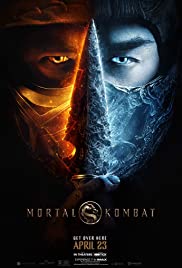
MORTAL KOMBAT
Australia/US, 2021, 110 minutes, Colour.
Lewis Tan, Jessica McNamee, Josh Lawson, Joe Taslim, Mehcad Brooks, Matilda Kimber, Laura Brent, Tadanobu Asano, Hiroyuki Sanada, Ludi Lin .
Directed by Simon Mc Quoid.
There is a different response for this action show, based on the celebrated video game, already filmed in the 1990s with Christopher Lambert, between the opinion of a reviewer and the opinion of a Mortal Kombat fan and player.
From a reviewer’s point of view, the main comment would be on the technical bravura of the whole film, its visual scope and style, the staging of the action sequences and battles, the importance of the intricate editing for the effect of the fights, the creation of the characters, their look, make up, iconic status, comments on the quality of the dialogue (functional for this kind of storytelling), the screen presence and performances of the cast (more iconic with martial arts talents than acting), the recommendation that it is a film for fans (which non-fans may not be interested in find more than a touch bewildering!). Lewis Tan is generally a cool hero, a touch of the laid-back to egos into action. Jessica McNamee, sporting an American accent, is a strong and attractive heroine. Josh Lawson, with his Aussie repartee, is a sometimes trying good deed turning baddy.
From a fan’s point of view, questions are raised – and can be seen in bloggers’ comments on such sites as the IMDb – as to its fidelity to the video game, its interpretation of the characters and their heroism, the treacheries, the building up of the conflicts, the staging of the fights. Fans will respond with enthusiasm if they like the fidelity and like the creativity of this interpretation, otherwise there will be disappointments and making some odious comparisons!
One of the major achievements of this film is that it was made in Adelaide, some moonscape sequences near Coober Pedy, others in the Mount Lofty Ranges, relying on South Australian resources, drawing on international talent as well as local. A mythical world is created, Earth and the Outworld, with particular look, costume and production design. There are sequences in the Japan of the past, Chicago of the present. And, vast caverns, vast arenas for conflict, a certain vastness in everything.
So, a review is mainly to note aspects of the film and deferring to the reactions of the fans.
Borat: Subsequent Movie Film

BORAT SUBSEQUENT MOVIEFILM: DELIVERY OF PRODIGIOUS BRIBE TO AMERICAN REGIME FOR MAKE BENEFIT ONCE GLORIOUS NATION OF KAZAKHSTAN.
US/UK, 2020, 95 minutes, Colour.
Sacha Baron Cohen, Maria Bakalova, Dani Popescu, (and Mike Pence and Rudy Giuliani).
Directed by Jason Woliner.
Even Sacha Baron Cohen might issue a warning about this Subsequent Moviefilm where he takes up his character, Borat from Kazakhstan (who has been in jail there for 14 years as a result of his shenanigans in the United States, harming international relations). His fans from the days of Ali G, through Borat, Bruno, The Dictator (while acknowledging his strong serious performance as Abbie Hoffman in The Trial of the Chicago 7) will know what to expect.
Enjoyment of his films will be a matter of taste. And some might add, a matter of bad taste. But, that is the intention of the satire, with everything (and everyone, here especially American politicians from Donald Trump to Mike Pence to Rudy Giuliani) considered fair game (by Sasha Baron Cohen that is, not the targets). All human behaviour can be the target for humour, for satire, sexuality and bodily functions, of course, issues of race and prejudice, bigotry, and stances on the extreme right.
So, with fair warning, and expecting the challenge to taste, it can be said that there are some very funny sequences in this film over and above the long title. Borat is his old self, accent and all, often obtuse, out of prison, discovering he has a 15-year-old daughter, newly commissioned to go to the United States to offer the gift of a celebrated monkey to Mike Pence. On the way, through various states, and with all kinds of disguises (including a Donald Trump mask at a Republican Convention with Mike Pence), with all kinds of pranks set-ups that Sasha Baron Cohen is famous for, encountering a lot of pleasant ordinary people along the way (Brian who sells mobile phones to an amazed Borat, the generous man who keeps faxing messages to the Kazakhstan president and back, the lady in the shop who acts as a fashion consultant, the beautician offering advice for his daughter, the kindly babysitter Jeanise Jones, who bonds with his daughter.
And the daughter is played by Bulgarian actress, Maria Bakalova, rather a game performance with all the things she is asked to do, with a hideously out of date book for sex instruction, her embarrassing breakthrough, an even more embarrassing dance at the prom. She received a Golden Globe nomination as well as Oscar nomination.
The most famous scene, talked and written about, causing controversy, is a prank set up where Rudy Giuliani eagerly agrees to do an interview with the daughter, is seen behaving more than a touch compromisingly in the aftermath, caught by borate.
Sacha Baron Cohen has very little time for American right-wing politics, has a sequence with two conspiracy theorists, Borat also believing that there was no Holocaust but meeting elderly Jewish women in the synagogue who explain that it happened.
Some of Sacha Baron Cohen’s fans have complained that it was too much like the original film – but, others have enjoyed his taking up the character once again, traversing the United States, holding so much up to satiric mockery, an ending, before the 2020 election where he was certainly not for the re-election of Donald Trump, and the sadness of the covid lockdown.
- The films of Sacha Baron Cohen? His type of satire? Upfront, pranks, wide range, awkward and embarrassing moments for subjects and audience? His acting skills?, Textile?
- The original film, 2006, Kazakhstan, going to the US, the satire?
- Borate, 14 years in prison, embarrassment to Kazakhstan? His release, the politics, the president, his mission? The monkey and its background? Gift to the United States? His discovery of his daughter?
- Going to the United States after meeting his daughter, acknowledging her, the choice of travelling in the cage, stowing away to America, eating the monkey? Her personality, prospects? The range of change throughout the United States, appearance, body enhancement, sexual issues, fashion and clothes? The discovery of American food? Relating to people? Her becoming the gift for Mike Pence?
- Borate, in the United States, something of a celebrity, his range of disguises, wigs, beards, even Donald Trump? His experiences, Brian and the Internet, sending the faxes back and forth to Kazakhstan, at the fair, discussion with the beautician, fashion and clothes, plastic surgery and enhancement? Shopkeepers? Meeting the rednecks, the conspiracy theories, staying with them? Going to rallies?
- The various meetings, the Republican women, the daughter at the meeting, her frank discussion about sexual behaviour, the book and its mythologies, her own sexual experience? The prom, the menstruation dance? Borate going to work at the Barbers to and money for the plastic surgery? His meeting Jeannie Jones, asking her to babysit?
- Jeannie Jones, her friendship with the daughter, the change of attitudes, the bond of friendship?
- The rally in Washington, the daughter and her stances?
- The rally with Mike Pence, borate disguised, exposed? Unable to give the gift?
- The setting up of Rudy Giuliani, the daughter as a reporter, the setup, the interview, Giuliani’s behaviour, of the bed, his trousers?
- The Jewish theme, anti-Semitism, the existence of the Holocaust, borate and his visit, the discussions with the survivors, changing his mind?
- Covert 19, 2020, the United States, the lockdown, its effect?
- The impact of the satire? Broad? Even awkward?